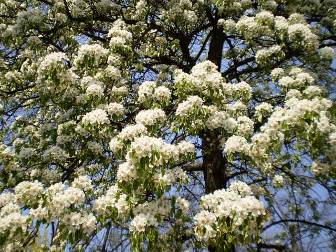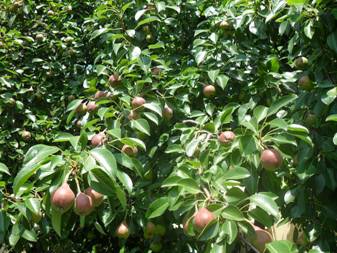

Pear (Pyrus), fam. Rosaceae.
Cultivated trees in the city, and wild ones in the forest are widespread. Forest pears are vey diverse in size, quantity, and taste (hardness, tartness) of fruit. With some fortune, it is possible to find quite good ones; however, it seems that every year this search should be repeated from the beginning, because different trees are successful in different years. For example, one of the trees that gave a huge crop in August 2012, did not even flower in 2013 – it "took a rest".
Pears have antidiarrhoeal, disinfectant, diuretic, antitussive and antipyretic action. The fruits of wild pear (and to a lesser degree – from cultivated, too) are pleasant to taste raw only from selected trees, and sometimes only after lying two-three months. During that time, they partially lose starch, which transforms into sugar; some tannins (making the fruit hard and astringent) also destroy. Because of these substances present in pears, people with even small problems with digestion should eat them with care, without combining with heavy food or water, and some sorts – lightly cooked.
It also should be noted that, unfortunately, pears (as well as apples) are several times inferior by the beneficial vitamins and minerals content to most other fruit and especially berries.